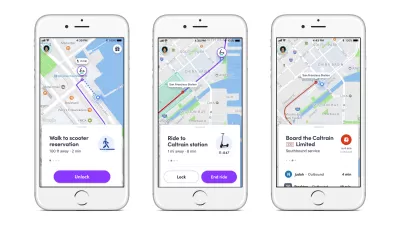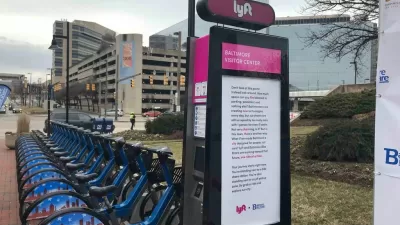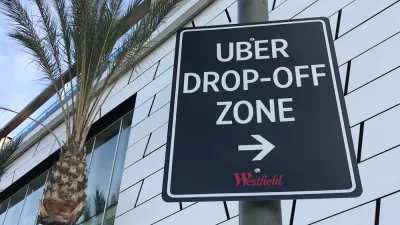Lyft's Emily Castor Warren situates the company's newest initiatives within the "rapid pace of innovation" occurring in transportation.

A Planning Report interview with Lyft's director of transportation policy, Emily Castor Warren, tracks the company's progression from serving lone riders to partnering with public agencies, moving into fixed-route "shuttle" service, and operating fleets of electric autonomous vehicles.
Lyft recently launched a research center to develop hardware and software for autonomous cars, and the company sees itself as playing a critical role in their rollout. Castor explains:
The experience we have in understanding how to provide an on-demand service, as well as the potential for us to roll out autonomous services in a controlled fashion through our platform—perhaps through the use of wheel-sensing technology or other types of controlled dispatching appropriate to the capabilities of the vehicles as they develop and become more mature—will be a huge asset for autonomous manufacturers who want to get rapid experience and testing, and to expose more products to real passengers who are already using the Lyft platform.
Throughout Lyft's lifepsan, partnerships have been a notable strategy. On top of the new in-house research center, Lyft has also pursued self-driving technology in collaboration with General Motors, Nutonomy, and Google's Waymo, among others. In TPR, Castor also elaborates on their first/last-mile programs in partnership with public transit authorities throughout California, as well as a nationwide partnership with Amtrak—all part of what she calls "a very significant shift that’s starting to arise in which the lines are blurred between traditional forms of public transit and new forms of on-demand mobility."
In contrast to common criticisms, Castor characterizes these programs as complementing, and indeed strengthening, public transit systems—whether by allowing the city to continue service on decommissioned bus routes, or by improving access to stations and "help[ing] commuters be able to choose the train for the vast majority of their commute." These types of partnerships, she suggests, are ideal for "suburban locations where traditional fixed-route transit simply can't gather enough riders to operate on a convenient or financially viable basis."
In some major urban centers, on the other hand, Lyft has launched its own fixed-route service: a "shuttle" option (which, despite its name, is operated out of personal vehicles.) It's intended to attract new customers who previously drove alone to share rides during peak commute hours, "when we know that our public transportation system is straining against its capacity."
The interview also covers Lyft's commitment to transportation electrification, its position on transportation infrastructure financing, and more.
FULL STORY: Lyft's Emily Castor: New Forms of On-Demand Mobility & Public Transit Mash Up

Alabama: Trump Terminates Settlements for Black Communities Harmed By Raw Sewage
Trump deemed the landmark civil rights agreement “illegal DEI and environmental justice policy.”

Planetizen Federal Action Tracker
A weekly monitor of how Trump’s orders and actions are impacting planners and planning in America.

The 120 Year Old Tiny Home Villages That Sheltered San Francisco’s Earthquake Refugees
More than a century ago, San Francisco mobilized to house thousands of residents displaced by the 1906 earthquake. Could their strategy offer a model for the present?

Ken Jennings Launches Transit Web Series
The Jeopardy champ wants you to ride public transit.

BLM To Rescind Public Lands Rule
The change will downgrade conservation, once again putting federal land at risk for mining and other extractive uses.

Indy Neighborhood Group Builds Temporary Multi-Use Path
Community members, aided in part by funding from the city, repurposed a vehicle lane to create a protected bike and pedestrian path for the summer season.
Urban Design for Planners 1: Software Tools
This six-course series explores essential urban design concepts using open source software and equips planners with the tools they need to participate fully in the urban design process.
Planning for Universal Design
Learn the tools for implementing Universal Design in planning regulations.
Clanton & Associates, Inc.
Jessamine County Fiscal Court
Institute for Housing and Urban Development Studies (IHS)
City of Grandview
Harvard GSD Executive Education
Toledo-Lucas County Plan Commissions
Salt Lake City
NYU Wagner Graduate School of Public Service





























